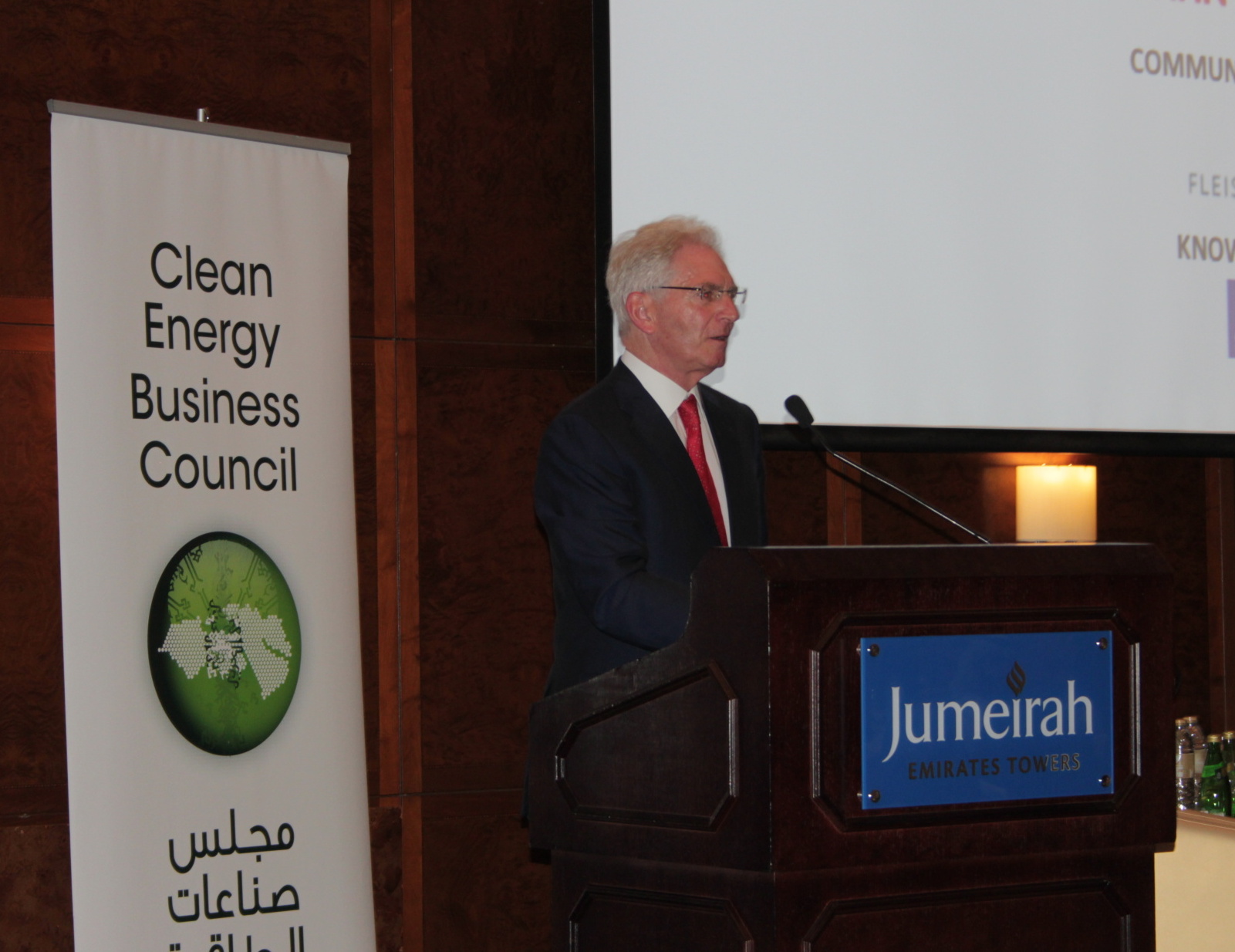The below speech was delivered as the opening address at the Clean Energy Business Council’s annual event held in Dubai on 8th Dec 2015.
Good Morning, ladies and gentlemen, or Alsalamu aleikoum as we say in this part of the world. Welcome to the CEBC’s 2015 Annual Event.
We are meeting at a historic moment in time. Global leaders have gathered in Paris to address the imminent threat climate change poses and attempt to finalize an international agreement to limit global warming and adapt to its impacts. Managing climate change is the central challenge facing humanity. But will we take action now or procrastinate as is characteristic of human nature?
Climate change is causing a dramatic shift in the earth’s ecosystems and food supply chains. Droughts are escalating, oceans are warming and acidifying, temperatures are increasing and ice-sheets are melting at alarming and unparalleled rates. We have entered the ‘Anthropocene age’ where humans are systematically destroying their environment, their livelihood, their home and their planet. What is unknown is the extent of destruction and damage that will impact the planet if this is left unchecked.
The recent Intergovernmental Panel on Climate Change Report predicts a global average temperature rise of 4° C or more by the end of this century. Temperature increases of this magnitude have not been seen for tens of millions of years. Too much or too little water has the potential of causing severe and sustained conflict that could result in the migration of hundreds of millions of people, and decimation of animal, plant life and habitat.
Much of the developed world have already made some commitment to reduce their carbon emissions. The EU aims to lower emissions from a 1990 baseline by at least 40% by 2030. The US has pledged a reduction in its GHG emissions by 26-28% below its 2005 levels. China, a leader in renewable energy investment has set a target of reducing its CO2 emissions per unit of GDP by 60-65% on 2005 levels by 2030. But to achieve these targets robust policy and regulation needs to be developed, and implemented locally.
Closer to home, the UAE announced plans to increase its low-carbon energy contribution to the overall energy mix from 0.2% in 2014 to 24% in 2021 by implementing energy efficiency measures, feed-in tariff reforms and demand-side management initiatives. Last month, the government unveiled the Dubai Clean Energy Strategy 2050 which will see 7% of the emirate’s energy come from clean energy sources by 2020, increasing to 25% by 2030, with a target of 75% by 2050. Plans also include the establishment of a Dh100 billion Dubai Green Fund as well as the DEWA Innovation Centre, which will house research and development laboratories in the field of clean energy with an estimated investment of 500 million dirhams.
Many other Middle East and North African countries are following suit with ambitious renewable energy programs underway including Morocco, Egypt, Kuwait, Jordan, Qatar, Saudi Arabia, Oman, Turkey, Bahrain, Iran and others.
Recent innovation and technological change imply that there is no trade-off between decarbonisation and economic growth. The transition to the new climate economy presents significant opportunities for growth inducing investment, job creation, new innovations, productivity growth and entrepreneurship, and the development of clean and renewable energy financing such as Green Bonds and Sukuk that will create a new asset class. The appetite is definitely there: green bond issues to pay for low carbon energy projects reached $36.6bn in 2014, more than triple the previous year.
We at the CEBC have been working closely with the Dubai Supreme Council of Energy to implement a Green Sukuk. The UAE’s open and developed international financial sector has the potential to become a global hub for renewable and clean energy financing.
The CEBC is incredibly excited about the future of clean energy in the MENA region as we see a major shift towards the adoption of renewables and clean-tech solutions, along with the necessary regulatory frameworks.
Job creation and human resources will play a key role in the new energy economy and its successful deployment. It is our view that the industry needs access to a wider pool of talented individuals. CEBC’s Women in Clean Energy program, which will be launched later in the morning, aims to help address this gap and will provide practical steps to encourage more women into jobs in the renewable and clean energy sectors.
It is my great pleasure to be joined today by distinguished guests and regional government representatives who will share the latest developments and insights into their country’s current activities, future plans and lessons learned. On behalf of the CEBC Board of Directors I would like to thank all of our guest speakers and share our deep appreciation for our international guests towards their valuable contributions to today’s discussions.
I would also like to thank our sponsors ENGIE, Adenium Energy Capital, Latham & Watkins, Unidaan, Concentrating Systems, and Fleishman Hillard for their generosity and support. As a not-for-profit organization, it is through sponsorship and funding from our members that we are able to deliver events such as this.
Let me end by quoting Christiana Figueres head of the UN Framework Convention on Climate Change, “never before has a responsibility been in the hands of so few”. You are pioneers of a new age. I would like to encourage you to get more involved in CEBC’s activities and networks. Please feel free to speak with any of our team during the day – we would be pleased to assist in any way.
Thank You.






